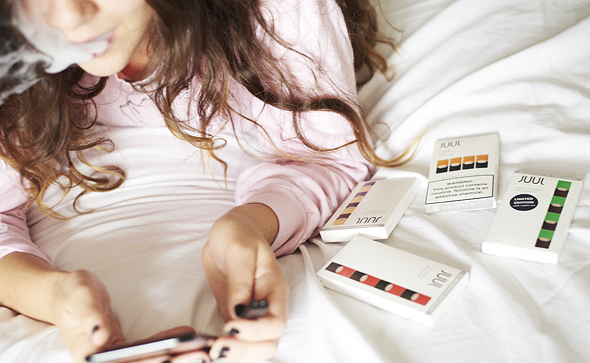Juul Petitions Israeli Supreme Court to Overturn Marketing Ban
On Tuesday, Israeli Prime Minister Benjamin Netanyahu signed off on the ban the country's ministry of health promoted against the e-cigarette
09:3024.08.18
E-cigarette developer Juul Labs Inc. has filed a petition with the Israeli Supreme Court to overturn a ban instituted against the company's products in Israel. Israeli Prime Minister Benjamin Netanyahu signed off on the ban Tuesday, after a three-month push by the country's ministry of health and deputy health minister Yaakov Litzman.
For daily updates, subscribe to our newsletter by clicking here.
The ministry stated it is opposed to any product with a nicotine content of over 20 mg. A Juul nicotine pod of the type sold in Israel contains 59 mg of nicotine, though the company does sell pods with reduced nicotine content in the U.K. to comply with European regulation.

Juul. Photo: Bloombergצילום: בלומברג
In the petition, filed by Juul and its Israeli subsidiary against Netanyahu, Litzman, and the health ministry, Juul claims the ban constitutes targeted legalization, as it only focuses on Juul and completely ignores similar products that have similar or higher nicotine content. The company specifically refers to Solaris, an e-cigarette marketed by Philip Morris only in Israel and Spain, which is sold as MarkTen in the U.S.
A spokeswoman for Philip Morris told Calcalist that Solaris is sold in Israel in two dosages, one under 20 mg and one over 20, with the approval of the health ministry. If the law would change, the spokeswoman added, Philip Morris would act accordingly to comply with the law.
Litzman was previously criticised for approving Philip Morris’ e-cigarette IQOS in 2017 without any restriction, going against the recommendation of Israel’s attorney general and several of Israel’s leading medical associations.
In the petition, Juul claims that scientific evidence shows that e-cigarettes are much less harmful than regular cigarettes, which are not banned in Israel. The company also states that the U.S. Food and Drug Administration approved the product in the U.S. and pushed the decision regarding Juul regulation to 2022.
The FDA sent Juul a formal request earlier this year for company documents about issues such as product marketing and youth initiation, to determine whether the company marketed its products to teens.
Related articles
As part of its decision to ban Juul, the Israeli health ministry held a hearing for the company in early July. In the petition, Juul states that the deadline for submitting its requested material to the ministry was August 7, but by August 6 Israeli media widely reported that a decision has been made to ban the product.
To further stress its claim of targeted legalization, Juul also points out a variety of harmful products—including tanning beds, processed meat products, trans fats and artificial food colorings—that the ministry has decided not to ban, an action Juul states proves the ban is a result of "conflicting interests."



